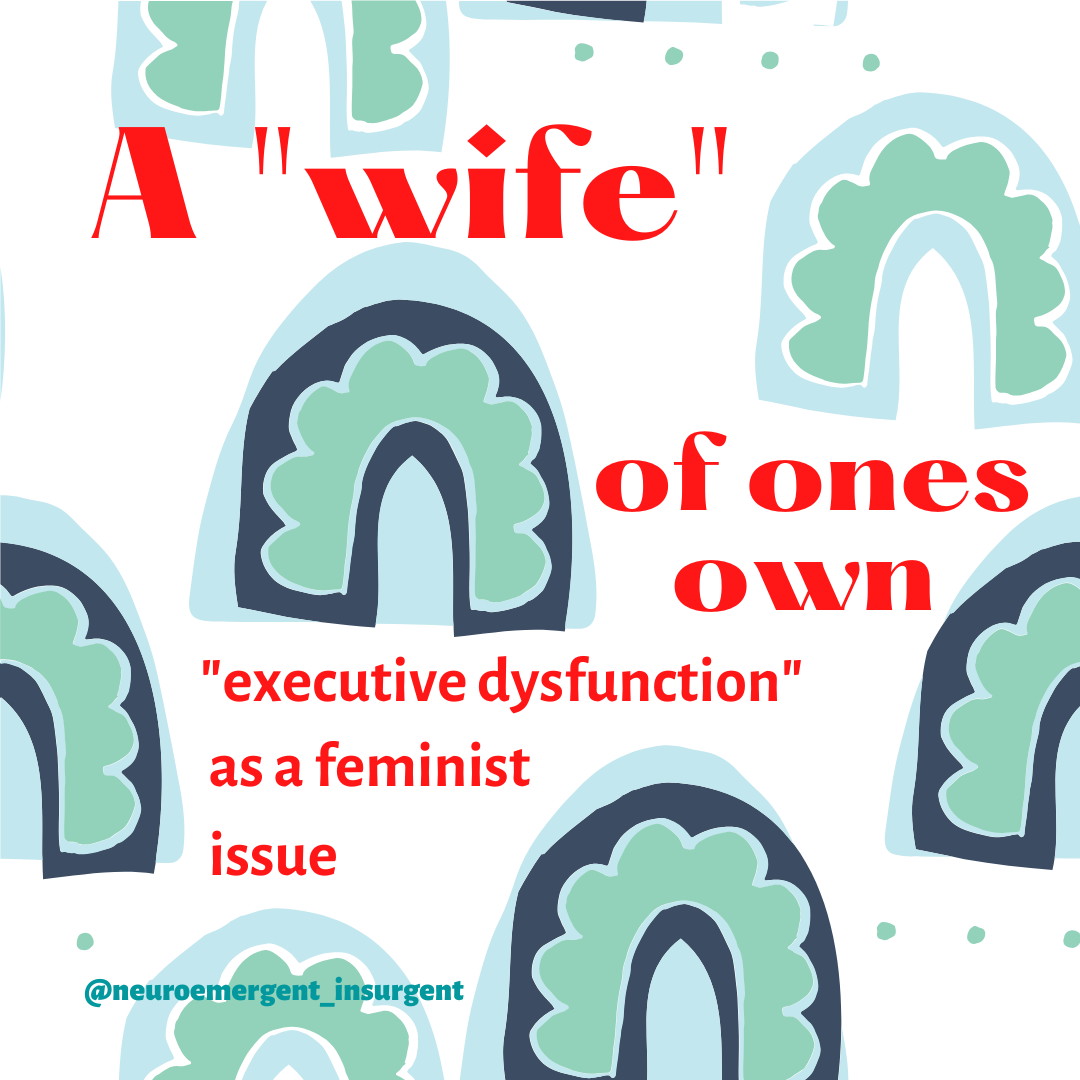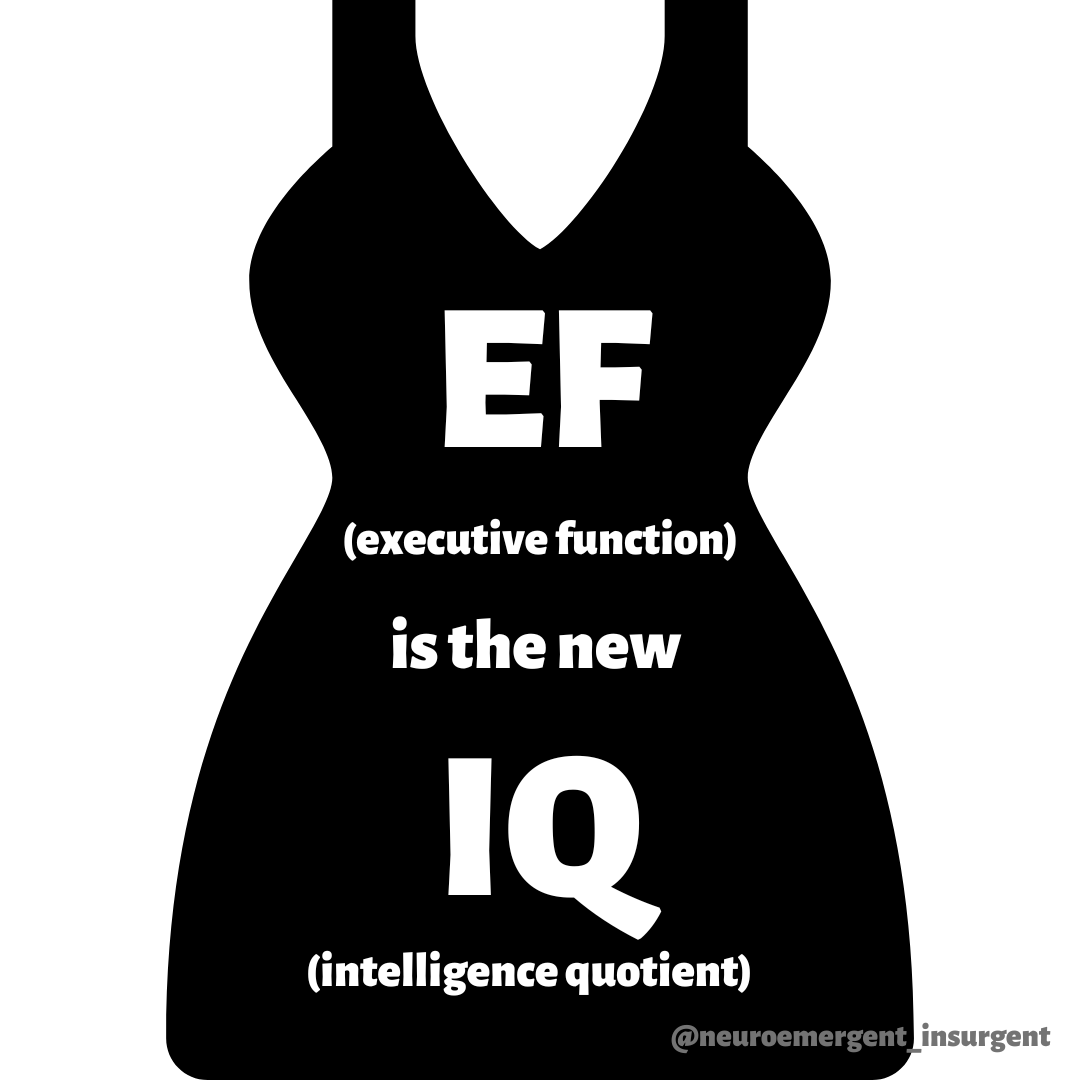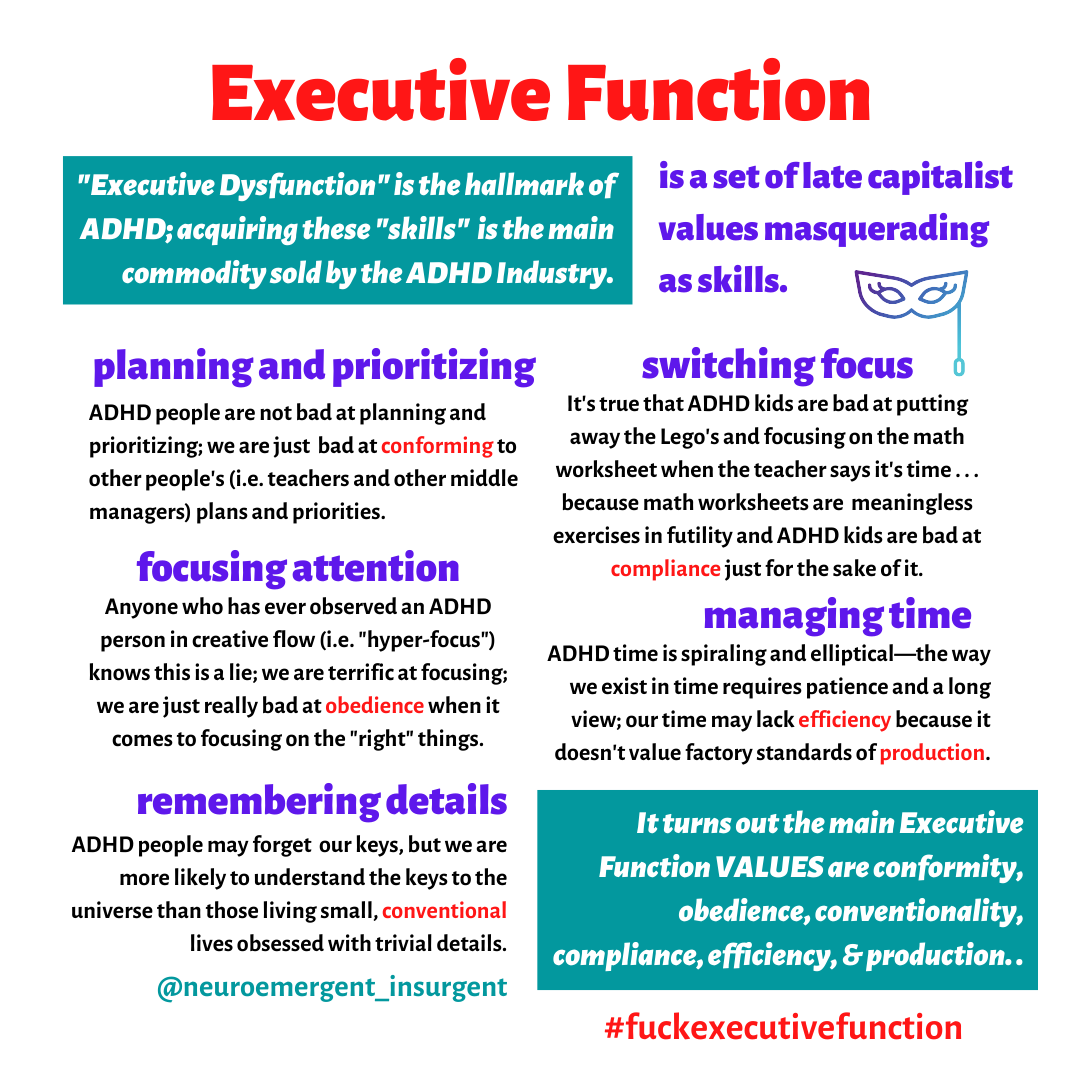Compulsory Executive Function
a roundup of my thoughts on the subject || discounted Early Bird tickets to NQYCP on sale now!
Compulsory Executive Function is one of the ideas we explore in-depth in Neuroqueering Your Creative Practice, and neuroqueering the problematic paradigm of executive functioning—and instead creating new paradigms and metaphors—are among the many powerful and healing experiences neuroqueerdos have in this course.
Discounted Early Bird tickets for NQYCP are still on sale until this Wednesday (scroll to the bottom of the page at the link).
This is a roundup (in reverse chronological order) of some of my own thoughts, from IG posts to interviews, on the topic of the executive functioning paradigm:
Compulsory Executive Functioning:
from an interview by Jesse Meadows of me and KR Moorhead (lightly edited)
Marta: I've started using the phrase Compulsory Executive Functioning, and it totally borrows from Adrienne Rich's compulsory heterosexuality. She was such an important influence on me when I was a young feminist and coming out as queer. And I do think that there are a lot of parallels with the set of skills that gets termed executive functioning.
I've been thinking a lot about it lately, and I I'm not sure if my thinking is changing or just deepening, but I do think that there is discrete set of skills that we could identify as executive functioning, like working memory and a particular orientation to time, and various organizational skills. I concede that there is a set of skills that we can identify as executive functioning. I'm a little bit more skeptical about the idea that they are intrinsic to some people and intrinsically disordered in others, because in my own experience, a lot of those skills are very much correlated with my levels of shame and anxiety. When there's a lot of shame and anxiety in my life, those skills tank. And when my life feels fairly calm and I feel supported, and I have spaciousness in time and space, those skills actually become much less dysfunctional in my own life. So it's definitely true that those are skills that as a neurodivergent person that I struggle with in a lot of contexts, but even there, it's on a spectrum, right, of how much I struggle or don't struggle with those things, based especially on shame and anxiety and stress in my life.
And I even think so called neurotypical people, who are really good at those things, when under enormous amounts of stress will also become bad at those things, so that's one part of it.
But another part of it is that they are a really small and, in my mind, fairly uninteresting set of skills. You know? And that we have sort of elevated them—some people describe them as “higher level thinking skills” and “the skills that make it possible for us to be human” kinds of skills.
And it seems to me that almost all of them are the kinds of skills hat most people with enormous privilege outsource to other people, and they don't pay them very much to do it…. They're skills that wives do and that housekeepers do and that secretaries do.
So I don't actually think that they are particularly interesting or important skills in and of themselves, especially when it relates to creativity and innovation and design and those kinds of things. And I think that the reason that we focus on them so much is that they are the skills that are necessary for students to be able to perform well in our educational system as it exists right now, and then to be able to go on and be productive cogs in the wheels of capitalism.
To be a good worker bee, you have to have this set of skills, so that's why it becomes compulsory, and I think there is an alternative set of skills—the skills that are required to be creative, to be innovative. I talk about them often in the context of design thinking.
Um, but I think that you could just call them the skills of creativity and innovation. And we do honor those skills in a small number of people. And the people who are successful in those realms are usually able to outsource the executive functioning skills. We don't treat those executive functioning skills as compulsory for that small group of privileged people who are allowed to be wacky and creative.
But if everybody were allowed to be designers and artists and creatives—and I do think those are, for most human beings, natural impulses, to be creative, to be innovative, to design things. But if we let the vast majority of human beings do that, capitalism would just fall apart.It just doesn't work if most people are performing in the world according to a different set of skills.
When you look at small children, they can't keep track of time in their bodies, and they are disorganized often, but they're very curious and creative and artistic. In order for us to turn those little children into workers who are going to keep the economy going for capital, we have to sort of drum that out of them. And I really believe that that's a lot of what our educational system does now. And I think it's becoming increasingly intolerable for most human beings because it's becoming more and more and more compulsory to conform to a specific set of skills and a specific way of working in the world. But I think that it's especially detrimental for neurodivergent people because we just really, really, really aren't good at that set of skills that, that we call executive functioning. And I also want to say that I think it's a set of skills, but when you read the sort of theorists of executive functioning, like Russell Barkley … he's not just talking about a discrete set of skills, like having good working memory and being organized and being able to understand time. He's talking much more about a kind of process: Identifying a goal and moving in a linear and focused and methodical and fast way towards achieving that goal.
Jesse: He also defines executive functioning as self control, the ability to put off rewards in the moment for future gains. Which is just a very capitalist concept.
Marta: And the “future gain” is always, like, being able to work in the world and earn a living and not be dependent on other people…. he's very concerned with people not being a burden on society, not being a burden on their families. He's very, very concerned about that. And by “burden,” what he means is needing other people to support you financially, or needing other people to support you in the tasks of daily living. In his mind, the worst thing that can befall a human being or a family or a community, is that there are individuals in it who need other people, basically. He argues, “there is no such thing as the common good.” That's sort of a foundational principle of his entire theory of executive functioning, that there is no such thing as the common good. And that to me is a value … not a fact, right? If you reject that set of values, if you believe there is a such thing as the common good, if you believe that depending on one another in our families, in our relationships, in our communities is not the worst thing that can befall a human being, then the whole idea that executive functioning is the most important thing kind of crumbles.
What is so terrible about needing somebody to help you eat? … How is it that these executives who are doing so well aren't relying on other people to help them eat when they order DoorDash or have a cook? We all depend on each other, and there very much is such a thing as the common good.
Jesse: There's this paper that I read recently by Robert Chapman about ecological functioning as a model for neurodivergent people, which is a level of group functioning? And I think that's a really good contrast to executive functioning, which is very individualistic.
A Wife of One’s Own: Executive Function as a Feminist Issue
Virginia Woolf famously wrote that in order for a woman to write fiction, she needed "a room of her own and £500." In other words, Woolf argued, the reason there were so few successful women fiction writers was because most women didn't have the space and the financial support to commit sufficient time and bandwidth to writing.
I adore Virginia Woolf. She is one of my patron saints. She was almost certainly autistic. Her fiction makes my heart sing. She was a prolific writer & critic. She also had a housekeeper, no children, & a husband who prioritized her work over even his own. I don't begrudge her any of this.
I do note, however, that in addition to having a room of their own and (the equivalent of) £500, most successful male writers and artists and creators (many of whom, let's face it, were neurodivergent) also had a WIFE, or at least a housekeeper.
So much of what we call "executive function" is also what is culturally regarded as "women's work": maintaining a household, keeping track of a schedule, managing paperwork, housework, laundry, feeding the kids.
The "executive function" experts love to talk about EF as "higher order thinking," such invaluable skills that we are tragically hobbled if we lack them.
This is a lie. The tell is the simple fact that almost all so-called "executive function" skills can be outsourced at very low wages to a secretary, housekeeper, nanny, or, entirely for free, to a . . . (you guessed it) WIFE.
EF is the New IQ
It’s like the new “little black dress” of capitalism
It's like the new Bell Curve of white supremacy.
And Russel Barkley is the new Charles Murphy
The Bell Curve: Intelligence and Class Structure in American Life by Richard J. Hernstein and Charles Murray is a book published in 1994 that argues "intelligence," not socioeconomic status, is the most salient predictor of personal outcomes, including financial income, job performance, out of wedlock birth, and involvement in crime.
In a nutshell, the book argues that poor people are poor because they are not smart enough, and that rich people are rich because they belong to the "cognitive elite." Moreover, they argue that Black people on average have lower IQ that white people, and that such a statistic is not only "scientific" and legitimate, but that it is also, by implication, explanatory: according to this theory, Black people are more poor because they are less smart [sic].
While a little more subtle, Russell Barkley makes essentially the same arguments about the poorly-defined concept of Executive Function.
Astonishingly, Barkley's claims are theoretical (and, I would argue, political): he doesn't even engage in statistical hocus-pocus like Hornstein and Murray.
He just looks at "bad" outcomes in society: people failing in school, people who can't support themselves financially, people who still depend on their families for support, people incarcerated by the criminal justice system—and from these "bad" outcomes he theorizes the existence of something he calls "Executive Function" to explain it all.
His entire theory of EF is tautological: these "bad" outcomes are both the definition of and the evidence for the existence of executive function.
This, btw, is not science.
This is just white supremacist industrial capitalism justifying itself.
Before you can object—"But I actually suffer from executive dysfunction!" and offer as evidence that you are unable to do X, Y, and Z very important thing—hear me out.
I am not arguing that many of us are not actually disabled. I am arguing that "Executive Dysfunction" has become a catch-all explanation for basically every ill that plagues us.
The neurodivergent community throws around the term "executive function" to explain practically everything that is hard for us. But we don't really know what it means (because no one actually does!)
First of all, there are many other explanations for why we have a hard time with some things—trauma, abuse, neglect, racism, poverty, shame, the demands of capitalism and industrial school/employment, the Western fetishization of individualism, independence and self-reliance. Just to name a few.
But even putting all of that aside, if you begin to actually read about what the so-called experts mean by the term "executive function," it is much narrower than we in the neurodivergent community have come to understand it means.
Without a hint of critical awareness or investigation, we have latched on to this concept of executive function—much like we latched on eagerly to RSD, the pathology de jour—and we don't actually have any idea what it even means.
Because even the so-called "experts" can't agree what it means, how to measure it, or if it even exists!
I fear we've been sold a bill of goods.
And we've paid dearly for it.
Executive Function is a set of late capitalist values masquerading as skills.
"Executive Dysfunction" is the hallmark of ADHD; acquiring these "skills" is the main commodity sold by the ADHD Industry.
Planning and prioritizing: ADHD people are not bad at planning and prioritizing; we are just bad at conforming to other people's (i.e. teachers and other middle managers) plans and priorities.
Focusing attention: Anyone who has ever observed an ADHD person in creative flow (i.e. "hyper-focus") knows this is a lie; we are terrific at focusing; we are just really bad at obedience when it comes to focusing on the "right" things.
Remembering details: ADHD people may forget our keys, but we are more likely to understand the keys to the universe than those living small, conventional lives obsessed with trivial details.
Switching focus: It's true that ADHD kids are bad at putting away the Lego's and focusing on the math worksheet when the teacher says it's time . . . because math worksheets are meaningless exercises in futility and ADHD kids are bad at compliance just for the sake of it.
Managing time: ADHD time is spiraling and elliptical—the way we exist in time requires patience and a long view; our time may lack efficiency because it doesn't value factory standards of production.
It turns out the main Executive Function VALUES are conformity, obedience, conventionality, compliance, efficiency, & production.
If you have any questions about Neuroqueering Your Creative Practice, don’t hesitate to leave a comment below or reply to this email. Discounted Early Bird tickets are on sale until this Wednesday, 27 August (just scroll to the bottom of the page in the link)!





